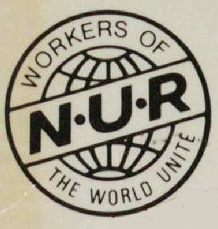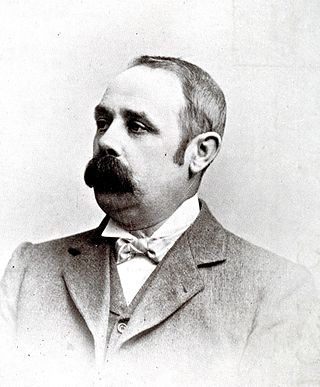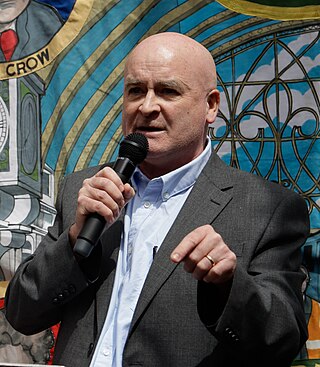
Robert Crow was an English trade union leader who served as the General Secretary of the National Union of Rail, Maritime and Transport Workers (RMT) from 2002 until his death in 2014. He was also a member of the General Council of the Trades Union Congress (TUC). A self-described "communist/socialist", he was a leading figure in the No to EU – Yes to Democracy campaign.

The Associated Society of Locomotive Engineers and Firemen (ASLEF) is a British trade union representing drivers of trains including services such as the London Underground (Tube). It is part of the International Transport Workers' Federation and the European Transport Workers' Federation. At the end of 2019 ASLEF had 24,479 members. Mick Whelan became its General Secretary in 2011.

The National Union of Rail, Maritime and Transport Workers is a British trade union covering the transport sector. Its current President is Alex Gordon and its current General Secretary is Mick Lynch.

James Henry Thomas was a Welsh trade unionist and politician. He was involved in a political scandal involving budget leaks.

The National Union of Railwaymen was a trade union of railway workers in the United Kingdom. The largest railway workers' union in the country, it was influential in the national trade union movement.

Hurlford is a village in East Ayrshire, Scotland, situated on the outskirts of Kilmarnock, the largest and administrative centre of East Ayrshire and East Ayrshire Council. It has a population of 4,968. Hurlford's former names include Whirlford and Hurdleford. The village was named Whirlford as a result of a ford crossing the River Irvine east of Hurlford Cross, near Shawhill. It shares its name in Gaelic, Baile Àtha Cliath with the Irish capital Dublin. The census locality is called Hurlford and Crookedholm.
Shildon railway works opened in 1833 in the town of Shildon in County Durham, England. Originally built to serve the Stockton and Darlington Railway the works grew to cover 40 acres (16 ha), employing 2,750 staff.
Albert Bellamy was an English trades unionist and Labour Party politician.
Sidney Weighell was an English footballer, trade unionist and the General Secretary of the National Union of Railwaymen from 1975 to 1983.

Concemore Thomas Thwaites Cramp, known as Charlie Cramp, was a British trade unionist and political activist.
Michael Joseph Cash is an English trade unionist, and the former general secretary of the National Union of Rail, Maritime and Transport Workers (RMT).

Virgin Trains East Coast (VTEC) was a train operating company in the United Kingdom that operated the InterCity East Coast franchise on the East Coast Main Line between London, Yorkshire, the North East and Scotland. It commenced operations on 1 March 2015, taking over from East Coast as a joint venture between Stagecoach (90%) and Virgin Group (10%).
Peter Pinkney is a British trade unionist, who served as President of the National Union of Rail, Maritime and Transport Workers (RMT) from December 2012 until 2015.

John Marchbank was a Scottish trade unionist.
James Campbell was a Scottish trade union leader.

James Edwin Williams was a British trade unionist.
John Benstead was a British trade unionist.

The 1919 United Kingdom railway strike was an industrial dispute that lasted from midnight 26–27 September to 5 October 1919. The strike was called to prevent the government from reducing rates of pay that had been negotiated by the Associated Society of Locomotive Engineers and Firemen (ASLEF) and the National Union of Railwaymen (NUR) during the First World War and to standardize pay rates for different grades of employment. After nine days of strike action, the government agreed to maintain wages until September 1920 and to complete wage negotiations before the end of the year.

Michael Lynch is a British-Irish trade unionist who has served as the General Secretary of the UK's National Union of Rail, Maritime and Transport Workers since May 2021. Since the high-profile rail strikes of 2022-2023, Lynch has become a spokesperson and symbol for the wider trade unionist movement.
The 2022–2024 United Kingdom railway strikes were an industrial dispute between rail workers and companies, with the latter supported by the UK government. The rail workers are represented by several unions including the National Union of Rail, Maritime and Transport Workers (RMT) and the Associated Society of Locomotive Engineers and Firemen (ASLEF). The railway strikes commenced on 21 June 2022 after workers walked out over wages, planned changes to working practices – involving the removal of guards from trains, the reduction in the number of open ticket offices, and an increase in the age at which people could claim the young persons and senior citizen card – and the threat of redundancies. The industrial action was the largest in the sector since 1989, and involved 40,000 workers nationwide.











